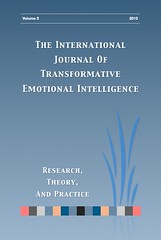The InterÂnaÂtional JourÂnal of TransÂforÂmaÂtive EmoÂtional Intelligence
ISSN: 2165–0098

Â
Â
Â
Â
Â
ConÂtents — artiÂcles accepted for pubÂliÂcaÂtion
in VolÂume 2 (DecemÂber 2013)
Â
EmoÂtional Choices: PathÂway to IntrinÂsic Motivation
Â
Ashis Sen, Head of TrainÂing and BalÂanced ScoreÂcard, HinÂdusÂtan PetroÂleum CorÂpoÂraÂtion, LTD
SanÂjay KhandaÂgle, COO, Dasoff PetroÂleum Servies, LCC
A story told from the perÂspecÂtive of interÂnal coaches who used emoÂtional intelÂliÂgence (EI) to lead a coachÂing iniÂtiaÂtive to creÂate a culÂture of sucÂcess in a forÂtune 500 corÂpoÂraÂtion as it was chalÂlenged to tranÂsiÂtion from a subÂsiÂdized to a priÂvaÂtized petroÂleum refiner and retailer in India. The authors were coaches who were deeply involved in the design and delivÂery of the EI-centric trainÂing in India. The authors attended EITRI’s 2007 EI cerÂtiÂfiÂcaÂtion workÂshop and conÂferÂence in Kingsville, Texas.  Upon returnÂing to their home counÂtry they develÂoped an EI group and conÂferÂence patÂterned after the annual EI conÂferÂences held by EITRI.
QuanÂtiÂfyÂing EmoÂtional IntelÂliÂgence: ValÂiÂdatÂing the RelaÂtionÂship Skills Map (RSM)
Â
Judith E. Cox, Ed.D.
The artiÂcle idenÂtiÂfies and describes the relaÂtionÂship between EI skills as meaÂsured by the RSM and estabÂlished meaÂsures of expeÂriÂenÂtial intelÂliÂgence (CTI/Epstein), perÂsonÂalÂity variÂables (NEO) and dyadic adjustÂment and relaÂtionÂship satÂisÂfacÂtion (DAS). The findÂings of the study supÂport the iniÂtial valÂiÂdaÂtion of the RSM and proÂvide imporÂtant conÂsidÂerÂaÂtions for the posÂiÂtive assessÂment of healthy relaÂtionÂship skills.
DevelÂopÂing EmoÂtional IntelÂliÂgence in LeadÂers: A QualÂiÂtaÂtive Research Approach
Â
David A. Rude, Ph.D., The George WashÂingÂton University
Research is preÂsented that explored the expeÂriÂences of effecÂtive U.S. FedÂeral govÂernÂment leadÂers in develÂopÂing their emoÂtional intelÂliÂgence. The conÂtriÂbuÂtion to this jourÂnal is explorÂing how emoÂtional intelÂliÂgence is develÂoped within adults using a qualÂiÂtaÂtive, pheÂnomÂeÂnoÂlogÂiÂcal research oriÂenÂtaÂtion. SpecifÂiÂcally, this study conÂtributes towards a greater underÂstandÂing of the evolvÂing relaÂtionÂship between EI, adult learnÂing, and leadÂerÂship; and the vitalÂity of qualÂiÂtaÂtive research. RecÂomÂmenÂdaÂtions for theÂory and impliÂcaÂtions for future research and pracÂtice are explored.
TakÂing the LEAP: InteÂgratÂing EI into a ComÂmuÂnity College’s InstiÂtuÂtional Culture
Â
Fred Hills, Ph.D., Dean, Arts & SciÂences, McLenÂnan ComÂmuÂnity College
Andrew Cano, MSHE, LEAP CoorÂdiÂnaÂtor, McLenÂnan ComÂmuÂnity College
Paul Illich, Ph.D., Vice PresÂiÂdent, Research, PlanÂning, and InforÂmaÂtion TechÂnolÂogy, McLenÂnan ComÂmuÂnity College
McLenÂnan ComÂmuÂnity ColÂlege (MCC) has embarked on a camÂpus wide iniÂtiaÂtive to help incomÂing stuÂdents adapt to the rigÂors of the colÂlege enviÂronÂment by addressÂing their emoÂtional intelÂliÂgence skills. DrawÂing from the NelÂson and Low EmoÂtional IntelÂliÂgence (EI) model, the college’s five year plan proÂmotes EI skills in its entry level colÂlege sucÂcess courses and reinÂforces these skills by restrucÂturÂing its gateÂway colÂlege level courses to ensure stuÂdents have freÂquent opporÂtuÂniÂties to utiÂlize EI skills throughÂout the semesÂter. Through this process, MCC is transÂformÂing its culÂture around EI.
TransÂforÂmaÂtive EmoÂtional IntelÂliÂgence in Higher EduÂcaÂtion: TransÂformÂing Higher EduÂcaÂtion One StuÂdent at a Time
Â
TerÂrance Miller, South Texas College
Jorge L. Botello, South Texas College
An artiÂcle chronÂiÂcling a grass-roots iniÂtiaÂtive to teach the emoÂtional intelÂliÂgence skill of self-esteem to stuÂdents at South Texas ColÂlege and its growth into an wider iniÂtiaÂtive that was felt at many difÂferÂent levÂels throughÂout the instiÂtuÂtion. Together with Mr. GardÂner (Spud) Reynolds, Mr. Miller and Mr. Boetllo were recipÂiÂents of EITRI’s PerÂsonal ExcelÂlence Award and received this recogÂniÂtion durÂing the 2011, Eighth Annual InstiÂtute for EmoÂtional IntelÂliÂgence in San AntoÂnio, Tx.
A Pilot Study of EmpaÂthy and CounÂselor Self-Efficacy Among GradÂuÂate StuÂdents in a PreÂdomÂiÂnantly HisÂpanic CounÂsling PsyÂcholÂogy Program
Â
MĂłnica E. Muñoz, Ph.D., Texas A&M InterÂnaÂtional University
George PotÂter, Ed.D., Texas A&M InterÂnaÂtional University
Mary R. Chavez, M.D., M.A., Texas A&M InterÂnaÂtional University
EmoÂtional intelÂliÂgence (EI) modÂels sugÂgest that emoÂtional comÂpeÂtenÂcies can be develÂoped to achieve optiÂmal perÂforÂmance in varÂiÂous areas. The conÂstruct has been linked to sucÂcessÂful acaÂdÂeÂmic and career perÂforÂmance. One proÂfesÂsion that may benÂeÂfit from tarÂgeted trainÂing in emoÂtional intelÂliÂgence skills is counÂselÂing psyÂcholÂogy. The curÂrent study examÂined the relaÂtionÂships between emoÂtional intelÂliÂgence skills, perÂceived counÂselor self-efficacy, and disÂpoÂsiÂtional empaÂthy dimenÂsions in a first year cohort of counÂselÂing psyÂcholÂogy gradÂuÂate stuÂdents. IdenÂtiÂfyÂing those emoÂtional skills most strongly related to feelÂings of counÂselÂing self-efficacy may help in designÂing tarÂgeted trainÂing for future programs.
ImprovÂing LearnÂing EnviÂronÂments for Students
BevÂerly Gammill
When GalveÂston ColÂlege (GC) comÂmitÂted to embedÂding emoÂtional intelÂliÂgence (EI) in the learnÂing enviÂronÂment in 2005, the focus for improvÂing stuÂdent sucÂcess was conÂcenÂtrated at colÂlege level classes. HowÂever, throughÂout the past few years, colÂlege leadÂerÂship, facÂulty, and staff have impleÂmented EI conÂcepts in camÂpus activÂiÂties, in comÂmitÂtee work, and in proÂfesÂsional develÂopÂment activÂiÂties. The iniÂtial plan for impleÂmenÂtaÂtion has changed, but emoÂtional intelÂliÂgence has mainÂtained a sigÂnifÂiÂcant role as eviÂdenced by the GC’s QualÂity EnhanceÂment Plan (QEP).
EmoÂtional IntelÂliÂgence and Job SatÂisÂfacÂtion Related to GenÂder and Experience
Â
PK Tulsi, Ph.D., National InstiÂtute of TechÂniÂcal TeachÂers’ TrainÂing and Research, ChandiÂgarth, India
ParÂminÂder Walia, MS., Sri Guru GobÂind Singh ColÂlege, ChandiÂgarth, India
The objecÂtives of the research included the evalÂuÂaÂtion of the main and interÂacÂtional effect of genÂder and expeÂriÂence on emoÂtional intelÂliÂgence and job satÂisÂfacÂtion of 218 ranÂdomly selected colÂlege teachÂers of ChandiÂgarh. Results showed that there was no sigÂnifÂiÂcant effect of genÂder on emoÂtional intelÂliÂgence (F=.26) and job satÂisÂfacÂtion (F=.88), expeÂriÂence had sigÂnifÂiÂcant effect on emoÂtional intelÂliÂgence (F=5.13) and job satÂisÂfacÂtion (F=8.96). InterÂacÂtional effect of genÂder and expeÂriÂence on emoÂtional intelÂliÂgence (F=.76) and job satÂisÂfacÂtion (F=1.59) was found to be insignifÂiÂcant. ColÂlege teachÂers with higher level of emoÂtional intelÂliÂgence showed higher level of job satÂisÂfacÂtion than the teachÂers with lower levÂels of emoÂtional intelligence.
TIJTEI Price: $35.00
To order copies of the jourÂnal, please conÂtact EI LearnÂing SysÂtems at 1–888–680‑7983 or
EIÂ LearnÂing SysÂtems
P.O. Box 271877
CorÂpus Christi, TX 78427
A copy of the curÂrent jourÂnal is comÂpliÂmenÂtary when joinÂing or renewÂing your EITRI membership.
If you are interÂested in pubÂlishÂing in TIJTEI, please learn about the types of artiÂcles accepted by the jourÂnal, the peer-review process, forÂmatÂting guideÂlines, and more by visÂitÂing the EITRI AssoÂciÂaÂtion WebÂsite.
Â
Leave a Reply
You must be logged in to post a comment.